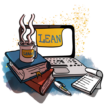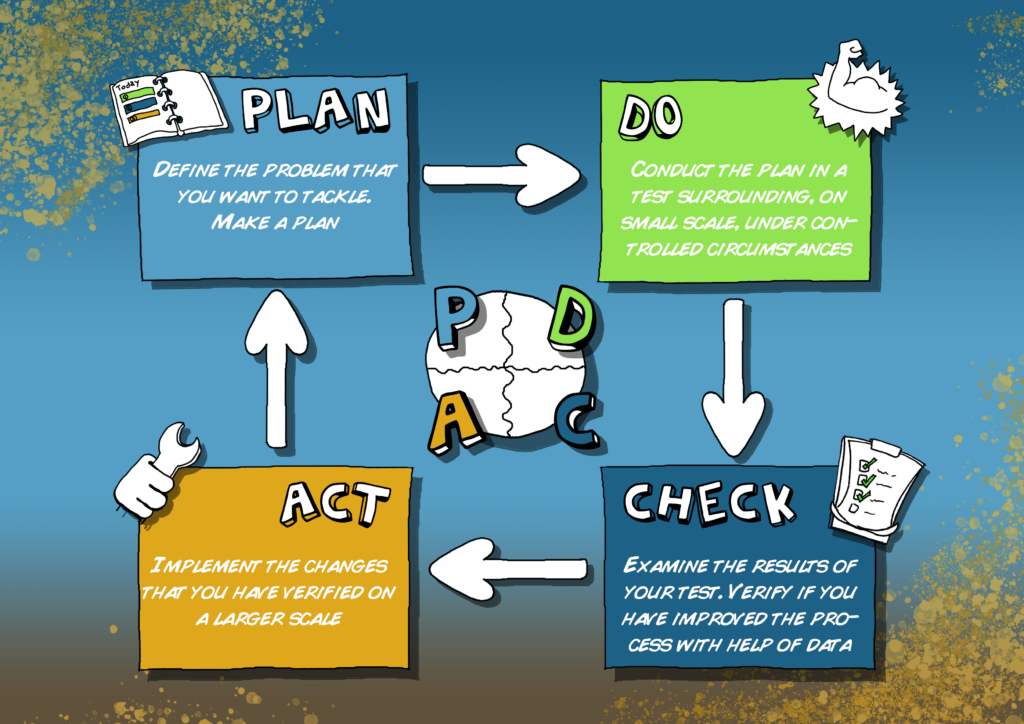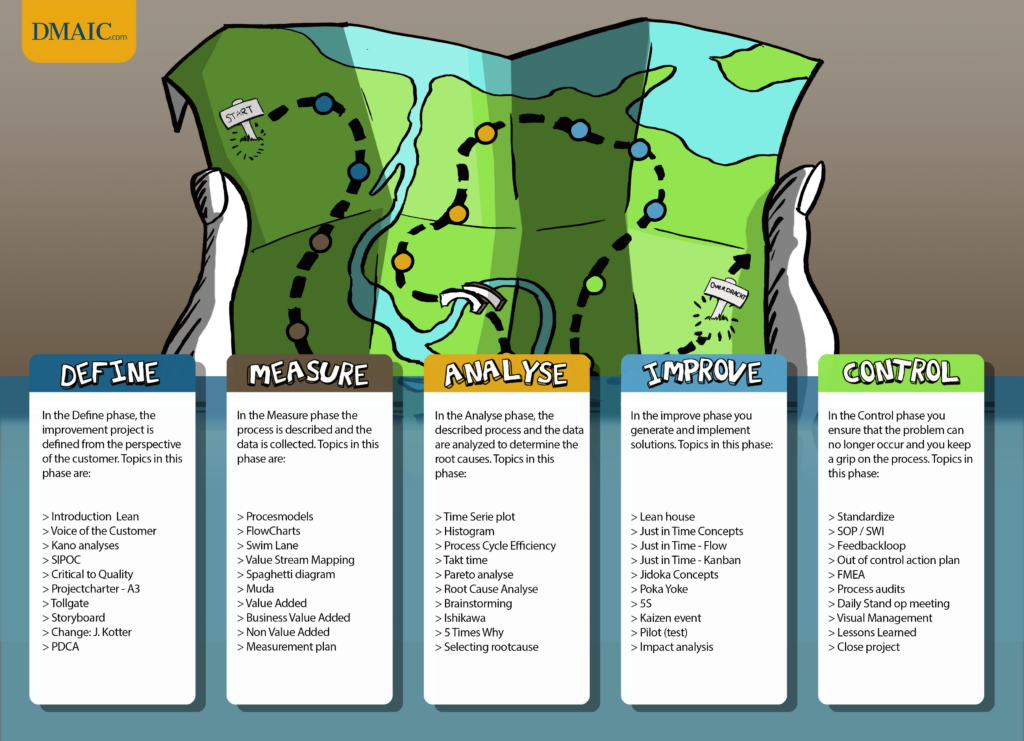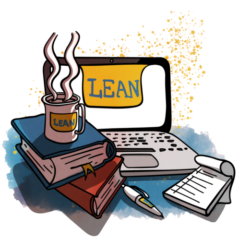-
How it works
How does it work?
Dmaic.com offers comprehensive and fully accredited online Lean training.
Read more Online packagesOnline trainingClassroom trainingsClassroom and in-company training
Online packagesOnline trainingClassroom trainingsClassroom and in-company trainingDmaic.com also offers classroom Lean and Lean Six Sigma training courses Read more
- Pricing
- Companies
- Knowledge
 Knowledge baseWant to know more about Dmaic and what Dmaic means for other companies? Check the Dmaic.com knowledge base.
Knowledge baseWant to know more about Dmaic and what Dmaic means for other companies? Check the Dmaic.com knowledge base. Online WorkshopsDon't immediately choose a course for you: do you want the knowledge and tools with which you can get started right away? Then a Dmaic-workshop is for you.
Online WorkshopsDon't immediately choose a course for you: do you want the knowledge and tools with which you can get started right away? Then a Dmaic-workshop is for you.- About
What is Lean?
What is Lean? An Exploration of Definitions
When you Google the word “Lean,” you’ll find several definitions. For instance, Lean is sometimes referred to as a purple drink or, alternatively, as a program for losing weight. Thus, the word Lean acts as a sort of container word, adaptable for various contexts.
In this article, I will explain Lean as a continuous improvement strategy, also known as Lean management or Lean manufacturing.
Lean in Practice: More Than a Buzzword
Lean is more than just a buzzword; it’s a transformative methodology and philosophy designed to foster a culture of continuous improvement within organizations. Originating from Toyota’s Production System (TPS), Lean has found applicability across various sectors and scales of business. Its focus is on streamlining processes and delivering maximum value to customers with minimal waste.
The Lean methodology we recognize today was honed and popularized by Toyota. With roots stretching back over 50 years, this system has garnered global recognition for its effectiveness in optimizing operations. Toyota’s methods have served as a blueprint for Lean, demonstrating its utility in achieving both short-term gains and long-term sustainability.
The Definition of Lean
Lean is fundamentally about creating value for customers, eliminating waste (muda, mura, and muri), and ensuring quality from the first attempt. This leads to higher product/service quality and increased customer satisfaction through reduced process cycle time, improved delivery times, fewer errors, and lower inventory levels.
- Creating value for customers.
- Eliminating waste in the process (muda, mura, and muri).
- First time right.
Thus, it’s about achieving maximum added value with minimal effort and delivering the best quality for the customer.
The Essence of Lean: Creating Value and Eliminating Waste
1 – Creating Value for the customer:
Value Added describes the value of a product or service from the customer’s perspective.
In organisations, people often have their own ideas about what the added value for the customer means. “Value for the customer” is important in Lean. This also helps to determine the activities that you should or should not do in the process. The focus of Lean is to deliver as much value as possible for the customer and to eliminate the activities that don´t add value (wastes).
The customer is the one who determines the value of the output of a process. If an activity is going to add value, it must meet with three criteria:
- The customer must be willing to pay for the activity
- The activity must transform/change the product or the service in some way according to the specification of the customer
- The activity must be done correctly the first time and without mistakes
This definition applies to all processes and in every organisation. To add value to a process, all action, activities, processes, people, organisations, systems, tools and all other resources that have something to do with the process must meet with these three criteria.
In Lean, we distinguish three types of Value Added:
- Value Added=value for the customer
- Business Non-Value added=doesn’t deliver direct value for the customer
- Non Value Added=all wastes
2 – Identifying and Eliminating Waste in Lean (Muda, Mura, Muri):
Muda are activities that cost time/money in the process without value being created for the customer.
The eight wastes are categorized as Type 2 Muda – in other words, activities that don’t add value and are considered unnecessary.These activities are first on the list to be eliminated.

The eight wastes:
Waste is all around you, every day and everywhere. You waste your time by waiting in line, waiting in traffic, or waiting at the counter of the bank. Taiichi Ohno established that there were seven forms of waste. Later on, one additional waste was added (Skills, not making use of talent). These 7+1 forms are:
1 – Transport
All movements of products or materials not required for value-adding activities are considered wastes.
2 – Inventory
Stock, wherever in the value stream, doesn´t add value. Stock can be necessary for bridging the imbalance between demand and production, but then it still doesn’t always add value. It represents a financial burden. It is exposed to damage, ageing, decay and quality problems. It takes up floor space and other resources for controlling and tracing it.
3 – Motion
Every movement from people who don´t add value to the process is waste. That includes walking, bending and lifting.
4 – Waiting
Waiting is waste in all forms. Every moment that a member of staff has to wait is waste.
5 – Overproduction
Producing more than the customer demands is also waste. It causes other wastes such as stock costs, work force and transport for processing the overflowing products, use of all materials, accommodation of overflowing capacity etc.
6 – Overprocessing
Every step of processing that either doesn’t add value to the product or that ends up with inadequate technology, sensitive materials or quality prevention, is also considered to be a waste. Examples include applying protective packaging in the process, conducting extra checks, delivering extra functionality that the customer didn’t ask for.
7 – Defects
Every process, product or service that doesn’t meet with the specifications of the customer, is a defect. Every process step that doesn’t transform the product or that doesn’t perform right the first time, is also waste.
8 – Skills
Everywhere where people work, we need to make use of the knowledge and know-how of these people. Not using this knowledge is seen as waste. Members of staff don’t deposit their brains at the entrance.
What is the waste Mura?:
Besides Muda, we have also got Mura as waste. This is imbalance, variation, non-standard and disparity in processes. Because of mura, there is no flow in the process. For example: when it is extremely busy on Monday in a process but on Friday, comparatively very calm.
In Lean, people observe the following two rules caused by Mura:
- Increasing Mura (variation) always results in a worse functioning production line
- Mura (variation) is always surrounded by a combination of the factors supply, capacity and time.
Often processes are not aligned with each other, and because of this Mura takes shape.
Decreasing Mura is important in Lean organisations. Variation is welcomed in each process by means of extra supplies, extra capacity and time. More Mura leads to more Muda (wastes).
What is the waste Muri?:
Besides Muda and Mura, we have also got Muri as waste.
Muri is the unnecessary or unfair overburden of people, machines or systems by demand, that does not take into account their capacity. Overburden can occur with people, as well as with machines.
- With people, Muri results in stress, burnouts and absenteeism.
- With machines, Muri leads to extra errors and stoppage.
One of Lean’s core principles is having respect for people. Don’t let staff undertake repetitive activities that are harmful, lavish or unnecessary.
Muri manifests itself in staff turnover, absenteeism, broken machines, stoppage and bad decision-making. You can use a number of tools to reduce heavy work – the pressure on the people must be minimal.
Lean: A Continuous Improvement Strategy
Lean ensures a higher quality of products/services and increased customer satisfaction. It assists in the following ways:
- Reducing Process Cycle Time: The Lean method enables organizations to make their processes more efficient and effective. By eliminating waste and unnecessary steps in the process, organizations can significantly reduce the total time required to produce a product or service. This leads not only to faster production times but also to lower costs and increased productivity.
- Improving Delivery Time of Products or Services: Lean principles help organizations shorten the lead time – the time from the start of the process to the delivery of the final product to the customer. This is achieved by improving workflow and reducing waiting times and delays in the production process. As a result, customers receive their products or services more quickly, leading to higher customer satisfaction.
- Reducing or Eliminating the Chance of Errors: Errors can lead to product defects, delays, extra costs, and dissatisfied customers. The Lean method aims for ‘First Time Right’, meaning the task is done correctly from the start. By standardizing, streamlining, and improving processes, organizations can reduce or even completely eliminate the chance of errors.
- Lowering Inventory Levels: Overproduction and excess inventory are seen as forms of waste in Lean philosophy. Too much inventory can lead to higher storage costs, risk of damage or aging of products, and inefficient use of capital. Lean techniques like Just-In-Time (JIT) production help organizations produce only what is needed, when it is needed, thereby reducing inventory levels and associated costs.
Lean helps organizations continuously improve their processes, increase efficiency, reduce costs, and enhance customer satisfaction. By focusing on customer value and eliminating waste, the organization can provide maximum value with minimal effort.
With Lean, you are never done. In a Lean organization, employees are engaged daily in eliminating waste, known as Continuous Improvement.
Dual Approaches to Implementing Lean
1 – Long-term Approach:
When an organization aims for a long-term Lean strategy, the objective is to instill a Continuous Improvement culture. Employees at all levels adopt a Lean mindset, which involves concentrating on customer value, eliminating wastes, and striving for perfection while performing tasks.
2 – Short-term Approach:
On the other side of the spectrum, Lean can tackle specific, immediate challenges within processes. By deploying Lean tools, you can rapidly identify problems and implement effective solutions.
Defining Lean Across Various Dimensions
Lean can be perceived as multiple things, but they all revolve around the same core principles: a philosophy, a method, a management philosophy, and a collection of tools and techniques.
Lean can be perceived as multiple things, but they all revolve around the same core principles:
- A Philosophy: It is a way of thinking that emphasizes customer value and continuous improvement.
- A Method: It is a systematic approach for identifying and eliminating waste in operations.
- A Management Philosophy: Lean integrates seamlessly into the management structure, promoting a culture focused on improvement.
- Tools and Techniques: From Six Sigma to 5S, various tools and techniques fall under the Lean umbrella.
Key Concepts of Lean
Critical concepts of Lean include focusing on customer value, daily continuous improvement, reducing variability, eliminating waste, just-in-time delivery, quality assurance, and fostering stakeholder relationships:
- Focus on Customer Value: Lean starts and ends with the customer. Every effort is aimed at enhancing the value delivered to the customer.
- Daily Continuous Improvement: Lean is not a one-time project but an ongoing effort.
- Reducing Variability: Lean aims to make processes as predictable as possible, enhancing efficiency and quality.
- Eliminating Waste: Whether it’s time, materials, or effort, Lean targets the elimination of waste in all forms.
- Just-In-Time Delivery: Lean promotes the timely production and delivery of products, reducing inventory costs.
- Quality Assurance: Getting it right the first time is a fundamental Lean principle, helping to reduce rework and errors.
- Stakeholder Relationships: Lean fosters long-term relationships with all stakeholders, recognizing that an organization is part of a larger ecosystem.
The Five Principles of Lean
Within the Lean methodology, there are five key core values and steps, also known as the five principles of Lean: define the value, map the value stream, ensure the right flow, implement a pull system, and strive for perfection.
The five principles of lean:
- Define the Value: The customer determines the value of a product or service. The first step is to identify customer demand and expectations. Ask yourself: what does the customer want, and what are their requirements and needs concerning your products or services?
- Map the Value Stream (the process): Create a value stream map that illustrates the workflow of process steps for a product or service. This map helps in identifying and eliminating waste (Muda), ultimately leading to reduced process delays and improved quality of the product or service.
- Ensure the Right Flow: Create a smooth and continuous flow in production or service delivery by eliminating obstacles and delays. An optimized process ensures maximum process efficiency and reduces waste.
- Implement a Pull System: Produce based on the actual demand of the customer, with the customer’s order acting as a ‘pull signal’. This ensures that overproduction is avoided and inventories remain limited.
- Strive for Perfection: Continuously repeat and improve the first four steps until perfection is achieved: a process that delivers value to the customer and is free of waste. This process of continuous improvement, also known as Kaizen, ensures that the organization is constantly adapting and improving.
By following and applying these core values and steps within your organization, you can effectively implement the Lean method to reduce waste, optimize processes, and ultimately provide more value to your customers.
Popular Improvement Methods: PDCA and DMAIC Cycles
The PDCA Cycle in Lean:
The Plan-Do-Check-Act (PDCA) cycle, developed in the 1930s by Walter Shewhart, a physicist at Bell Telephone and the founder of statistical quality control, was later introduced in Japan in the 1950s by W. Edwards Deming. In Japan, it’s known as the Deming cycle and is also referred to as the Plan-Do-Study-Act (PDSA) cycle. The four phases of the PDCA (or PDSA) cycle are as follows:
- Plan: Define the problem you aim to address. Develop a change plan and document specifically what you want to change. Outline the necessary steps for implementing this change, understand the associated risks, and predict the outcomes of the change.
- Do: Implement the plan on a small scale in a controlled environment. Measure the outcomes of this test implementation.
- Check: Evaluate the test results. Use data to determine whether the process has improved. If improvement is noted, consider applying the changes on a larger scale. If no improvement is observed, revise the plan and try again.
- Act: If the changes are successful, implement them on a larger scale. Update standard work instructions and ensure compliance with the new procedures.
In Japan, the PDCA is regarded as the fundamental model for conducting Kaizens, which are small, daily improvements. The PDCA cycle is a straightforward model that can be utilized by everyone. It is commonly employed in Lean for small and frequent improvement initiatives: the Kaizens or Daily Improvements.”
These edits refine the structure and flow of your original text, making it more coherent and reader-friendly, particularly for an American English-speaking audience.

The DMAIC Cycle in Lean:
This structured problem-solving method, used in Lean (and also Six Sigma), is applied in the business world to improve processes. It offers a systematic approach to solving problems, extending from identifying issues to ensuring lasting solutions. This method has a clear beginning (Define) and an end (Control).
By consistently implementing DMAIC projects throughout the organization and involving various participants in improvement teams, a culture of continuous improvement is cultivated.
In an organization with a continuous improvement culture, the pursuit of perfection is ongoing, with multiple DMAIC projects either following one another or occurring simultaneously.
Each phase of the DMAIC cycle has a specific focus:
- Define: The problem is identified. Key questions include: Which customers are affected by process issues? What do our customers want? What exactly is the problem? How will the problem be approached?
- Measure: The process is detailed and data is gathered. Key considerations include: How does the current process function? What are the steps in the current process? How significant is the problem? What data collection methods will be used?
- Analyze: The root cause of the problem is sought. This involves analyzing collected data and identifying primary causes. Questions to consider are: What is causing the problem? What does the data reveal? What are the primary (structural) causes? What are the priorities?
- Improve: The process is enhanced. This phase involves developing and testing solutions. Key questions include: What is the best solution? How will the solution be tested and implemented?
- Control: The process is monitored to ensure continued success. This phase involves establishing measures to prevent recurrence of the problem. Considerations include: What activities need monitoring? How are potential issues flagged? When is the process considered ‘out of control’?”

Conclusion: Understanding Lean
Lean transcends being merely a collection of tools; it embodies a philosophical approach dedicated to boosting organizational efficiency and heightening customer satisfaction. In the short term, Lean tools adeptly address specific challenges. Over the long haul, embedding a Lean mindset cultivates a transformative environment, perpetuating a culture steeped in continuous improvement.
Whether your goal is to resolve immediate operational challenges or to invest in a resilient, sustainable future, Lean emerges as a dynamic and time-tested beacon, offering a rich tapestry of principles and tools to navigate your journey.
Embark on Your Lean Mastery: Flexible Online Lean Green Belt Training Awaits
Are you eager to embrace Lean principles but find yourself constrained by a hectic schedule?
Our online online Lean Green Belt training is the perfect solution for you. Tailor-made for professionals with dynamic schedules, this program offers the flexibility to explore the intricacies of Lean methodology at a pace that suits you best, all from the comfort and convenience of your home or office. Embark on this transformative journey to become a Lean expert, reshaping your professional landscape on your own terms. Master Lean principles with ease and adaptability, ensuring your growth and success in today’s fast-paced business world.
Start Your Lean Journey Today!

